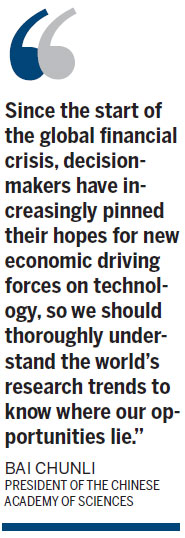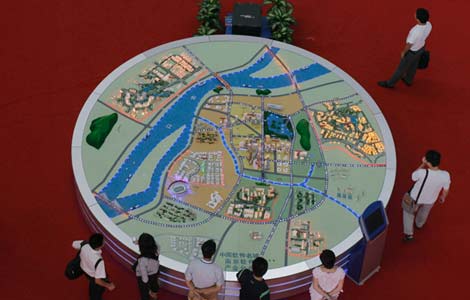Report shows future trends
Updated: 2013-06-24 07:13
By Cheng Yingqi (China Daily)
|
||||||||

Chinese Academy of Sciences outlines sci-tech ambitions
Science has changed people's lives in the past decade in ways we never before imagined. But where will new technology take us in the future?
Will we find aliens? Invent a human-brain computer? Produce synthetic organisms?
All these are possible, according to a report from the Chinese Academy of Sciences.
On Thursday, the CAS released Vision 2020: The Emerging Trends in Science and Technology and Strategic Option of China, a report composed by 200-plus experts after more than a year of research into trends in the international scientific community and in China.
"Since the start of the global financial crisis, decision-makers have increasingly pinned their hopes for new economic driving forces on technology, so we should thoroughly understand the world's research trends to know where our opportunities lie," said Bai Chunli, president of the CAS.
"Knowing the possible fields and directions for science-technology breakthroughs, we can proactively deploy our own research resources and develop strategic emerging industries to gain the initiative in the next round of development."
The report predicts 22 major events that may substantially influence world science by 2020, including solving the puzzle of antimatter, revealing the mind's circuit diagram and finding evidence of extraterrestrial life.
It also points out sci-tech problems that require more investment in China, such as the cause of dusty haze, quantum information technology, stem cell biology and regenerative medicine.
The space revolution and the structure of matter are two promising research directions for physicists, said Yu Lu, a researcher at the CAS Institute of Theoretical Physics.
"In the 20th century, two major breakthroughs drove the industrial revolution - the theory of relativity and quantum theory," he said. "In this century, are there any scientific problems as important as those two and theories that we are already close to discovering?"
One such example came last year when physicists in an underground laboratory near the Daya Bay Reactor in Guangdong province found a new type of neutrino oscillation, which is crucial for explaining the origins of the universe.
The neutrino oscillation type was a mystery that had been left unsolved by two Nobel Prize winners, and the identification was listed among the Top 10 Scientific Breakthroughs of 2012 by Science magazine.
"That was a highly competitive research direction," Yu said. "As far as I know, three international teams were doing similar experiments, but we were the first that began to collect data, and the first to come to a conclusion.
"This competition will continue, and we're now planning a new experimental site, to keep our leading position," he said.
Energy, resources, materials and manufacturing, information technology, agriculture and population health are strategic research directions, also.
"The report not only represents the research deployment of the CAS, but also mirrors our overall research power in China," said Zhou Qi , deputy director of the CAS Institute of Zoology.
He said that in the past two years, Chinese research programs have received huge attention from abroad, especially in the field of public health.
"Genome technologies enable the application of personalized medicine," Zhou said. "Maybe in the future, we will be able to combine genome technology with industry and make it part of curing infectious disease, tumors and chronic disease."
He said he also sees opportunities in regenerative medicine, such as artificial organs and tissue.
"Within five to 10 years, scientists are likely to grasp the technology of creating synthetic life with stem cell technology, so we also include the direction in our research plan," he said. "However, advanced synthetic life technology raises ethical questions: If stem cells make us no longer need a man and woman to create babies, and if two men or two women are able to have babies, there would be an unprecedented challenge to our ethics.
"As a result, ethical thinking should start now, instead of waiting till we have the technology," Zhou said, adding that to meet the challenge of technology advancement the CAS has started projects for bioethics research.
chengyingqi@chinadaily.com.cn
(China Daily USA 06/24/2013 page7)
Most Viewed
Editor's Picks

|

|

|

|

|

|
Today's Top News
China shares deepen downward spiral
Snowden exposes more US hacking, then flies
Xi vows bigger stride in space exploration
Mandela's condition critical
Suspect in shooting spree detained
Mountaineers killed in Pakistan
Foreign firms eye new 'opening-up'
Project halted due to bird nests
US Weekly

|

|















